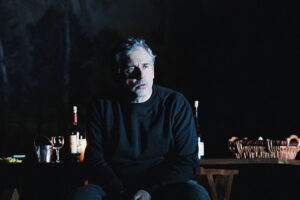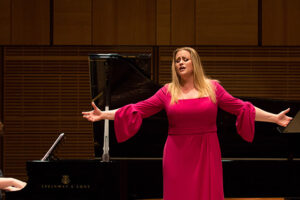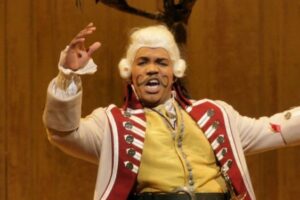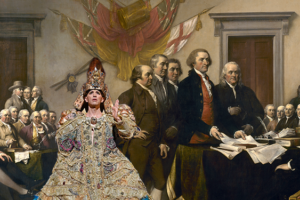

In 1849, the overworked and unhealthy composer produced Die Lustigen Weiber von Windsor. This was a triumphant hit, soon popular around the world, but he died two months later. Mercifully, he did not live to see Verdi’s Falstaff drive his version of the tale from the stage—except in German-speaking lands, where Nicolai’s agreeable tunestack holds its own.
As a composer, Nicolai is within the melodious pre-Wagnerian tradition of Weber, Marschner, Lortzing and von Flotow, and the libretto of Weiber is tighter than most of theirs. The music of his fairies owes much of its spirit (and some of its orchestration) to Mendelssohn’s Midsummer, which is high praise. The arias (of Frau Fluth, Anna and Fenton) call for adept and stylish singing; the “action” scenes and concerted numbers build and explode. This is a worthy score, less sophisticated than Verdi’s but memorable, easy to like. It would be a fine choice for a music school presentation, except that its vocal intricacies may be beyond inexperienced performers.
The cast of the Juilliard production (three performances, of which I caught the second—one more remains, on Sunday at 2) are mostly second- and third-year members of degree programs there, and a top-notch lot they are. There are two delights here: a delectable score too rarely heard and an introduction at close quarters (the Meredith Willson Theater on the third floor) to half a dozen young singers ready for takeoff, indeed already flying.
A Falstaff needs only to fit in a fat suit and bluster about, though actorly smarts and a robust basso are welcome traits of the character. Alex Rosen is not only genuinely funny, he has impressive bel canto chops, a sizable, warm, beautiful and even sound from bottom to top, and an engaging stage presence—even a passable falsetto when disguised as the Fat Lady of Bretford. (Lots of fat-shaming in this, or any, Falstaff opera! Be warned!)
Two other low voices of distinction appeared: Hubert Zapior as jealous Herr Fluth (whose wife is the principal object of Falstaff’s attentions) and William Guanbo Su as Herr Reich. The scene of Falstaff and Fluth rather lacks the timing, the buttons, the wit of Boito and Verdi’s version, but Zapior huffs and puffs mellifluously.
There are two tenor roles. Fenton, Anna Reich’s successful suitor, is sung by John Chongyoon Noh with a Camarena-like line and sweetness—they cut his aria’s second verse and I was sad. Spärlich, one of the rejects, is sung by Matthew Pearce, who looked correctly preposterous but did not convey foolishness in his high, clear voice. Both these guys could do justice to Offenbach or Lehar, where the tenor usually lets us down. The other reject, Andrew Munn as Dr. Caius, rather overdid the French accent. It wasn’t funny.
Christine Taylor Price sang Frau Fluth. She has a solid voice of good size, smudgy ornaments, a top that feels shrill, detached from the body of the voice, and withal no command of German. It was an acceptable performance of a role that demands a bright prima donna tone. Her colleague, Frau Reich, has a lovely ballad about Herne the Hunter, but it was deleted; Kady Evanyshyn sang the remainder of the role pleasantly enough.
The star, for me, was Jessica Niles as Anna Reich This role is usually given, in Germany, to the house ingenue, who must somehow cope with a full-length aria da bravura, but here Niles came into her own, with a soprano of startling power, a force and beauty and expressiveness—even sensuality—that stopped the show.
It would be difficult to fit an orchestra into the Willson Theater (though Juilliard managed this with the chamber orchestra of The Rape of Lucretia); sadly, we were reduced to two pianos under the direction of Teddy Poll, though members of the small chorus turned up with a violin and a piccolo for Anna and Fenton’s love duet and the fairy scenes. The Overture used to be a favorite with orchestral “pops” programs back when there were orchestral pops programs, and its charms are considerable.
The opera is a Singspiel, with spoken dialogue between musical numbers, and though the dialogue deserves many a snip, director John Giampietro’s notion of replacing nearly all of it with bits of Shakespeare—mostly from plays like Henry IV that have nothing to do with the matter at hand—is intrusive and absurd. (The dialogue is in English, the singing in German—that works well enough, and the titles are clear.)
Juilliard has set the story in 1941 for some reason. Something about the way the Brits fought nobly on the home front. (Then why are none of Anna’s suitors in uniform? The inappropriate costumes—I loved the clunky ’40s shoes though I bet the singers didn’t—are by Audrey Nauman.) No doubt everyone is singing in German as a patriotic gesture: Lose the war now!
It permits Giampietro to put his sopranos in Rosie-the-Riveter drag, while the chorus of fairies attacking Falstaff wear gas masks. Many of the scenes appear to take place in a munitions factory, but no one has attempted to ration Falstaff’s drinking in the Inn scene. There is an air raid (30 seconds long) during one scene… and then everyone forgets all about it.
Photos: Richard Termine
























Comments